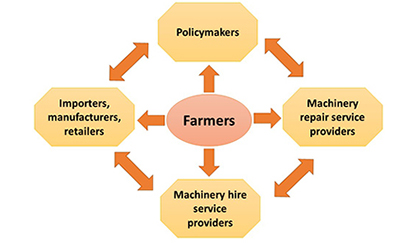frica’s agricultural sector is a significant contributor to the continent’s economy, employing millions of people and providing food for both domestic consumption and international trade. However, despite its potential, the sector faces numerous challenges that hinder its growth and development. One crucial aspect that can help address these challenges is supply chain management. Effective supply chain management can play a vital role in promoting agricultural development in Africa by improving efficiency, reducing costs, and increasing the competitiveness of agricultural products.
Challenges Facing Agricultural Development in Africa
Before delving into the role of supply chain management, it’s essential to understand the challenges facing agricultural development in Africa. Some of the key challenges include:
- Inadequate Infrastructure: Poor road networks, lack of storage facilities, and inefficient transportation systems increase costs and lead to post-harvest losses.
- Limited Access to Markets: Many farmers in Africa lack access to markets, making it difficult for them to sell their products and get a fair price.
- Inefficient Production Systems: Traditional farming practices and lack of technology lead to low productivity and poor quality products.
- Post-Harvest Losses: Inefficient handling, storage, and transportation lead to significant post-harvest losses, reducing the quantity and quality of products available for consumption and trade.
The Role of Supply Chain Management
Supply chain management can help address these challenges by:
- Improving Efficiency: Streamlining processes and eliminating unnecessary steps can reduce costs, improve productivity, and increase the competitiveness of agricultural products.
- Reducing Post-Harvest Losses: Implementing proper handling, storage, and transportation practices can minimize losses and ensure that products reach the market in good condition.
- Increasing Access to Markets: Developing relationships with buyers and creating market linkages can help farmers access local, regional, and international markets.
- Enhancing Quality: Implementing quality control measures can ensure that products meet the required standards, increasing their value and competitiveness.
Key Components of Effective Supply Chain Management in Agriculture
To achieve these benefits, several key components of supply chain management are essential:
- Farm-to-Market Linkages: Developing relationships between farmers, processors, and buyers can help ensure that products reach the market efficiently and effectively.
- Infrastructure Development: Investing in infrastructure such as roads, storage facilities, and transportation systems can reduce costs and improve efficiency.
- Technology Adoption: Implementing technologies such as precision agriculture, blockchain, and mobile payments can improve productivity, transparency, and efficiency.
- Capacity Building: Providing training and capacity-building programs for farmers, processors, and other stakeholders can enhance their skills and knowledge.
- Risk Management: Developing strategies to manage risks such as climate change, pests, and diseases can help minimize losses and ensure the stability of the supply chain.
Examples of Successful Supply Chain Management in African Agriculture
Several examples demonstrate the potential of supply chain management in promoting agricultural development in Africa:
- Kenya’s Horticulture Sector: Kenya’s horticulture sector has developed a sophisticated supply chain that connects smallholder farmers to international markets, generating significant income and employment opportunities.
- Ghana’s Cocoa Sector: Ghana’s cocoa sector has implemented a supply chain management system that ensures quality and transparency, increasing the value of cocoa exports and benefiting farmers.
- Rwanda’s Coffee Sector: Rwanda’s coffee sector has developed a supply chain that connects smallholder farmers to international markets, improving the quality and value of coffee exports.
Conclusion
Effective supply chain management can play a vital role in promoting agricultural development in Africa by improving efficiency, reducing costs, and increasing the competitiveness of agricultural products. By developing farm-to-market linkages, investing in infrastructure, adopting technology, building capacity, and managing risks, African countries can unlock the potential of their agricultural sectors and achieve sustainable economic growth and development. As the continent continues to grow and develop, the importance of supply chain management in agriculture will only continue to increase.
Meta AI response: The Role of Supply

